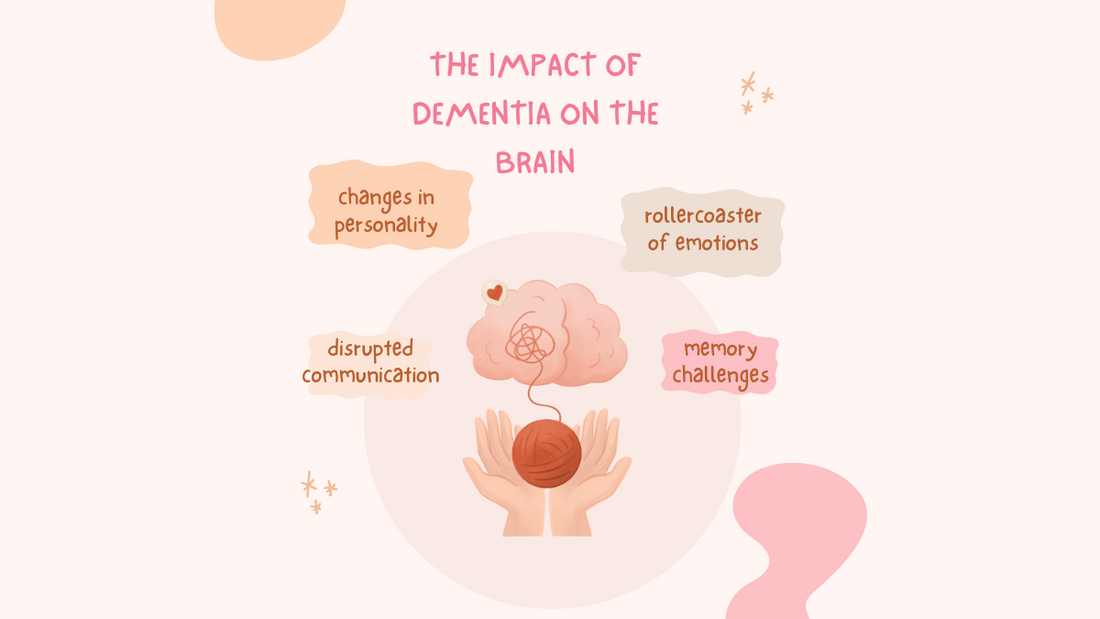
Deciphering the Enigma: The Impact of Dementia on the Brain
Medforte AdminShare
Today, we venture into the intricate world of the human brain to understand how dementia, a condition affecting millions worldwide, reshapes cognition, behaviour, and daily life. Join us as we explore how dementia influences the brain, delving into the profound changes it inflicts on memories, emotions, and the very essence of one's being.
The Brain: A Marvel of Complexity
To fathom the impact of dementia on the brain, let's begin by acknowledging the sheer complexity of this remarkable organ. Comprising billions of neurons interconnected in a web of intricate pathways, the brain governs every facet of our existence, from memory formation to emotional regulation and bodily control.
Dementia's Disruptive Presence
Dementia disrupts this harmonious orchestra of neural activity. While dementia takes various forms, each type has a unique way of interfering with brain function. For instance, Alzheimer's disease prompts the accumulation of abnormal proteins like beta-amyloid and tau, disrupting neural communication and ultimately leading to the death of brain cells.
The Fragility of Memory: The Role of the Hippocampus
Critical to our memory processes is the hippocampus, a small but essential region of the brain. Alzheimer's often strikes here early, eroding this vital area. As the hippocampus deteriorates, individuals struggle to retain recent memories, making even mundane daily tasks increasingly challenging.
Frontal and Temporal Lobes: Guardians of Personality
Frontotemporal dementia primarily targets the frontal and temporal lobes of the brain, responsible for personality, behaviour, language, and emotions. As these regions succumb to the disease, individuals may undergo personality changes, display impulsivity, and grapple with emotional regulation.
Disrupted Communication Pathways
Dementia frequently impairs the brain's ability to process and transmit information. Communication difficulties, a hallmark of various dementia forms, surface as neural pathways break down. This manifests as difficulty finding words, following conversations, or comprehending speech.
A Rollercoaster of Emotions and Behaviour
Changes in mood and behaviour accompany dementia's progression. Individuals may experience heightened anxiety, depression, irritability, or sudden mood swings. These emotional upheavals often correlate with the physical transformations within the brain.
Caring with Compassion and Understanding
While the journey through dementia is undoubtedly challenging, comprehending how it affects the brain is the cornerstone of compassionate care. It's essential to remember that every individual's experience with dementia is unique, with the pace and pattern of decline varying widely.
By fostering a supportive environment and seeking professional guidance, we can offer those grappling with dementia a path marked by dignity and grace.
The Brain: A Marvel of Complexity
To fathom the impact of dementia on the brain, let's begin by acknowledging the sheer complexity of this remarkable organ. Comprising billions of neurons interconnected in a web of intricate pathways, the brain governs every facet of our existence, from memory formation to emotional regulation and bodily control.
Dementia's Disruptive Presence
Dementia disrupts this harmonious orchestra of neural activity. While dementia takes various forms, each type has a unique way of interfering with brain function. For instance, Alzheimer's disease prompts the accumulation of abnormal proteins like beta-amyloid and tau, disrupting neural communication and ultimately leading to the death of brain cells.
The Fragility of Memory: The Role of the Hippocampus
Critical to our memory processes is the hippocampus, a small but essential region of the brain. Alzheimer's often strikes here early, eroding this vital area. As the hippocampus deteriorates, individuals struggle to retain recent memories, making even mundane daily tasks increasingly challenging.
Frontal and Temporal Lobes: Guardians of Personality
Frontotemporal dementia primarily targets the frontal and temporal lobes of the brain, responsible for personality, behaviour, language, and emotions. As these regions succumb to the disease, individuals may undergo personality changes, display impulsivity, and grapple with emotional regulation.
Disrupted Communication Pathways
Dementia frequently impairs the brain's ability to process and transmit information. Communication difficulties, a hallmark of various dementia forms, surface as neural pathways break down. This manifests as difficulty finding words, following conversations, or comprehending speech.
A Rollercoaster of Emotions and Behaviour
Changes in mood and behaviour accompany dementia's progression. Individuals may experience heightened anxiety, depression, irritability, or sudden mood swings. These emotional upheavals often correlate with the physical transformations within the brain.
Caring with Compassion and Understanding
While the journey through dementia is undoubtedly challenging, comprehending how it affects the brain is the cornerstone of compassionate care. It's essential to remember that every individual's experience with dementia is unique, with the pace and pattern of decline varying widely.
By fostering a supportive environment and seeking professional guidance, we can offer those grappling with dementia a path marked by dignity and grace.

